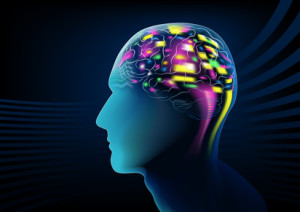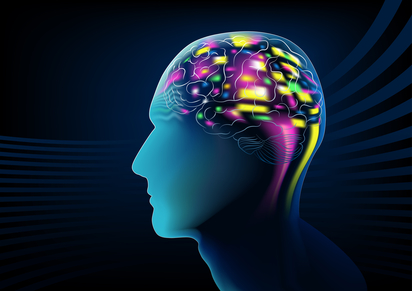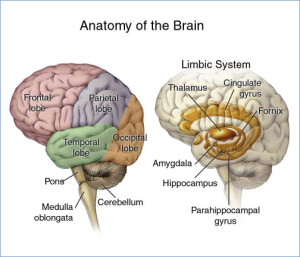
Michael Persinger said he reproduced every aspect of the “God” experience in a laboratory. He modified a snowmobile helmet that had solenoids placed over the temporal lobes. The device produced magnetic fields patterned after physiological sources in an attempt to enhance the probability of activating the brain structure from which the signal was derived. “What we have found is that individuals who show a temporal lobe sensitivity or creativity and who are very religious—in that setting—they will have a religious experience. We can generate the presence, which is defined as ‘God.’”
The device is known as the “God helmet,” as many subjects have reported having some sort of a mystical experience or altered state while wearing it. Persinger claims that 80% of his subjects reported feeling something when the magnetic fields were applied. He calls one of the most common sensations the “sense of presence.” This is feeling like there is someone else in the room with you when there is none. The results of his experiments have been mixed, as several effects reported by Persinger have not been replicated.
He disputes the failed replication attempts, saying that the experimenters did not actually replicate his process as claimed. You can watch a shorter video and a longer video on Persinger’s God helmet. The longer one includes commentary on a session with Richard Dawkins, the famed atheist. Dawkins said: “Unfortunately, I didn’t get the sensation of a presence.” He said he was disappointed, as he would have liked to experience something like what religious people experience.
The above research with the so-called God helmet is within a controversial field called neurotheology, which is “the scientific study of the neural correlates of religious or spiritual beliefs and practices.” Aldous Huxley was the first to use the term in his novel, Island. Other researchers object to the term, preferring expressions such as the neuroscience of religion. Following the thought of Laurence McKinney, many researchers into neurotheology hold that religious thought is a recent development tied to the evolution of the pre-frontal cortex in humans.
Andrew Newberg and others posit that neurological processes driven by the repetitive, rhythmic stimulation of human ritual contributes to transcendental feelings of connection. He said that ritual turns a meaningful idea into a visceral experience. “Rituals add substance to our beliefs, and the more intense the ritual, the more likely we are to have a religious or spiritual epiphany.” But rituals are hard to study because there are so many variables to consider. But, he said they are beginning to discover that thinking about God changes our brain. “The moment we encounter God, or the idea of God, our brain begins to change” (Newberg, How God Changes Our Brain).
Different religious activities have different effects on specific parts of the brain, but this does not make the results any easier to interpret. For example, praying silently affects one part of the brain, while praying out loud affects another part. And if you repeat the same prayer over and over, one part of the brain may be activated in the first few minutes, another part might quiet down ten minutes later, while other brain functions will change after forty or fifty minutes of intense prayer.
Newberg theorizes that different areas of the brain influence our perception of God. The frontal lobe creates and integrates all your ideas about God—positive or negative, including the logic used to evaluate religious and spiritual beliefs. The thalamus gives emotional meaning to your concept of God. The occipital-parietal circuit identifies God as an object that exists in the world. The parietal-frontal circuit establishes a relationship between YOU and GOD. “It places God in space and allows you to experience God’s presence. If the amygdala is overly stimulated, it suppresses the frontal lobe’s ability to think logically about God and elicits an emotional impression of an authoritative, punitive God.
Newberg noted how his past research focused on individuals who were deeply committed to their religious and spiritual beliefs, but he discovered that even if you could take God out of the ritual, you could still influence the brain. “Spiritual practices are designed to stimulate dramatic experiences, but you can also transfer nearly any religious ideology from one spiritual practice to another and still receive the same neurological benefits from the experience.” He cited the research of Herbert Benson in the early 1970s, when he extracted key elements from Buddhist meditation to develop the relaxation response. Read “The Brain and God,” for a further discussion of How God Changes Your Brain.
In Religion and the Sciences of Origins, Kelly James Clark said that while neurotheology has the potential of reducing God to nothing more than electromagnetic brain stimulations, there is precious little evidence to support the claim. “According to the creators of the God helmet, God-spasms (religious beliefs) are the products of perfectly natural electromagnetic processes.” If there is a natural explanation for religious belief, you eliminate the need for a supernatural one. “But so far, they have failed to come up with a natural explanation.”
Above, Andrew Newberg commented on the difficulty in scientifically studying religious rituals because of the multiplicity of variables to consider. This also impedes the scientific proof or disproof of God. First, many people see God as an infinite, all-powerful, and all-knowing being. “In contrast, we are finite, fairly weak, and limited.” So how can we know if our beliefs about God and the universe are accurate or true? Wouldn’t we have to experience and evaluate every possible variable, every potential perspective?
Even if we could test every religious belief and spiritual practice, each of us has a brain that will interpret the data and experiences in very different ways. There may be a universal or ultimate truth, but I doubt whether the limitations of the human mind will ever allow us to accurately perceive it or find any common ground, especially when it comes to the reality of God.
Newberg noted those who believe they have received the word of God, either directly or through scriptures. “But even the Bible cannot fully capture the reality of God. Our understanding will always fall short, no matter how perfect the words may be.” I think this is true for all religious and spiritual beliefs. And I also believe it is consistent with the teachings of the Bible, which for me, is the perfect, special revelation from God to humanity. IT is revelation from God and thus true. WE are limited and could never perceive the full reality of God or his revelation in the Bible.
There is a plain revelation of the invisible attributes of God, his eternal power and divine nature, in the created order (Romans 1:20). And yet God’s thoughts are not our thoughts; his ways are not our ways. “For as the heavens are higher than the earth, so are my ways higher than your ways and my thoughts than your thoughts” (Isaiah 55:8-9).
Humans have both a physical (soma) and a psychological (psyche) nature. They are then psycho-somatic unities of body and soul, so finding evidence for physiological brain activity as a believer experiences God is to be expected. The shared human nature of believers and nonbelievers indicates that similar physiological brain activity should be expected as they experience what they understand to be God. The difference is in where the individual’s faith is grounded. For Christians, that faith is in Jesus Christ. Ephesians 2:8-9 says: “For by grace you have been saved through faith. And this is not your own doing; it is the gift of God.”
If Christianity is true, there will be a final, indisputable experience of God where science, religion and spiritual experience will coincide. I wonder what brain scans would show then.






